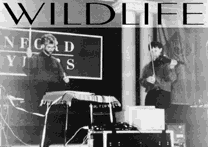
performance at Stanford University Centennial Concert
(click
to enlarge photo)
a computer-extended duo
for Zeta violin, Radio Drum,
and two computers
David A. Jaffe & W. Andrew Schloss
There are five
movements:
I Sonata "Sacre"
(2:43 min)
II The Most Religious
(4:04 min )
III Reversed Orbits
(4:17 min )
IV Oracular and Prophetic
(4:31 min )
V Edible Trance
(4:17 min )
Wildlife is an interactive work for two performers, a violinist and a percussionist,
performing on new instruments, augmented by two computers. The malleable nature
of the Zeta Violin and Mathews/Boie Radio Drum allows the barriers that normally
separate performers to be broken down, challenging the inviolability of the
control a performer normally exerts over his instrument. For example, the violinist's
glissandi can change the pitch of the notes played by the percussionist. Alternatively,
the pitches performed by the percussionist can be completely determined by the
violinist. Furthermore, the two performers interact with the computers in a
flexible, symbiotic manner.
This duo explores new means of ensemble interaction; it consists of a gestural
intercourse between four participants, two biological and two synthetic. Each
participant has the capability of direct manipulation of the others. This is
employed sometimes in the spirit of cooperation, other times more like sabotage.
The piece is in five movements, with each movement exploring a different ensemble
relationship. The titles of the movements are as follows:
- Sonata "Sacre"
- The Most Religious
- Reversed Orbits
- Oracular and Prophetic
- Edible Trance
The two computers used are a Macintosh IIci and a NeXT. The Macintosh computer
receives serial data from the Radio Drum and MIDI data from the Zeta violin
and does event processing, using software built by the composers with the MAX
system. It then sends MIDI data to the NeXT computer, which does further event
processing, algorithmic generation and DSP (digital signal processing) synthesis,
as well as sending MIDI data to a Yamaha TG77 synthesizer. The NeXT computer
is running software built by the composers using Ensemble and the NeXT Music
Kit system.
Note that no stored sequences or pre-recorded material of any kind are used.
All sound is produced in response to physical and musical gestures of the performers.
Although the music is worked out in great detail, the performers are given freedom
to spontaneously alter its flow on micro and macro time scales.
This recording is a live performance at the Stanford University
Centennial Concert in Frost Amphitheater on Sept. 27, 1991. This was
a historic event for several reasons, not the least of which was the
presence of Leon Theremin, who was approaching 100 years himself.
Biography of David A. Jaffe
David A. Jaffe has written a large body of music, including orchestral, computer,
vocal, solo and chamber music. He received the Doctor of Musical Arts degree
from Stanford University's Center for Computer Research in Music and Acoustics
in 1982. He has received two NEA Composer Fellowships and was the 1991 NEA Composer-In-Residence
with the San Francisco vocal ensemble, Chanticleer. He has had commissions from
such ensembles as the Modern Mandolin Quartet, the Kronos Quartet, and Mostly
Modern. In 1990, he was the Rockefeller Foundation Visiting Composer to LIPM,
Buenos Aires, where his music was performed by the Quartet of Buenos Aires and
the Quartet of Argentina. His music is published by Schott and Plucked Strings
Inc. and available on CD from Wergo, Warner Bros. and Centaur. As a researcher,
Jaffe has worked in the fields of plucked string synthesis, ensemble interaction
in computer music, synthesizer design, and object-oriented software design.
Jaffe will be a visiting faculty at Princeton University in computer music composition
in 1992.
Biography of W. Andrew Schloss
Andrew Schloss, percussionist, composer and researcher, was born in Hartford,
Connecticut in 1952. He studied at Bennington College, the University of Washington,
and Stanford University, where he was a researcher at the Center for Computer
Research in Music and Acoustics (CCRMA), and received the Ph.D. degree from
Stanford in 1985. Since that time, he has taught at Brown University, the University
of California at San Diego, and now at the University of Victoria.
Recently, he was awarded a Fulbright grant to conduct research at IRCAM in
Paris, during which time he tested, refined and employed a new percussion interface
designed by Max Mathews and Bob Boie. The duo makes extensive use of this instrument.
Schloss's research and composition in computer music have been presented in
North and South America, and in Europe at various festivals. In addition, he
has performed as a percussionist in many situations, such as on Broadway in
New York, and with Peter Brook's production of The Conference of the Birds.
In addition to this duo formed with David Jaffe, he has recently been performing
with Paris-based jazz pianist Jeff Gardner in Europe and the United States.
aschloss@finearts.uvic.ca
